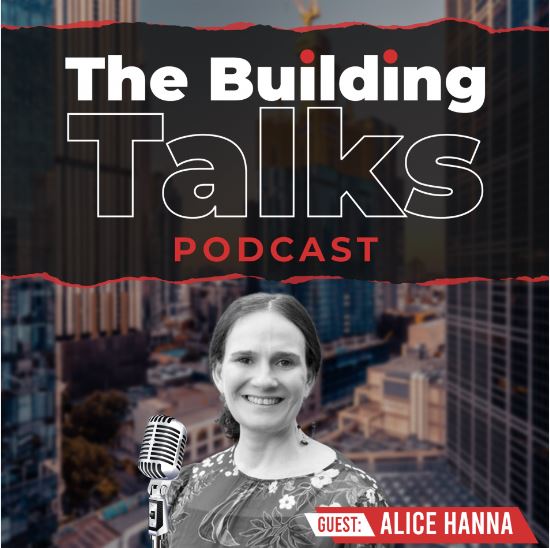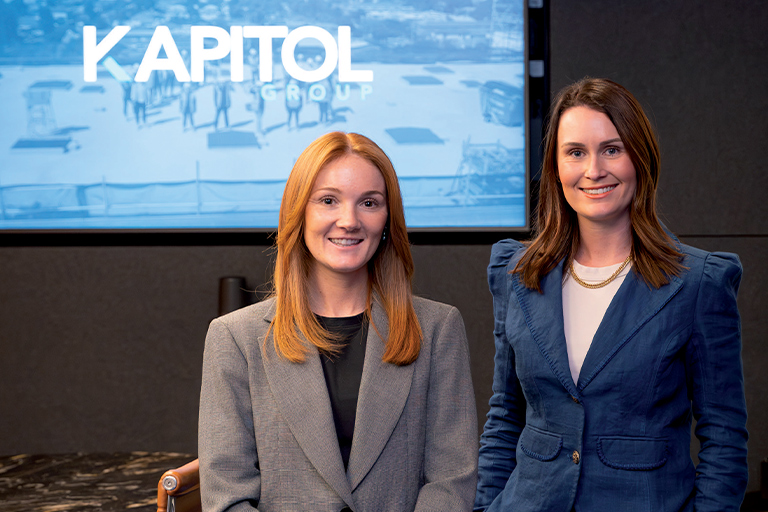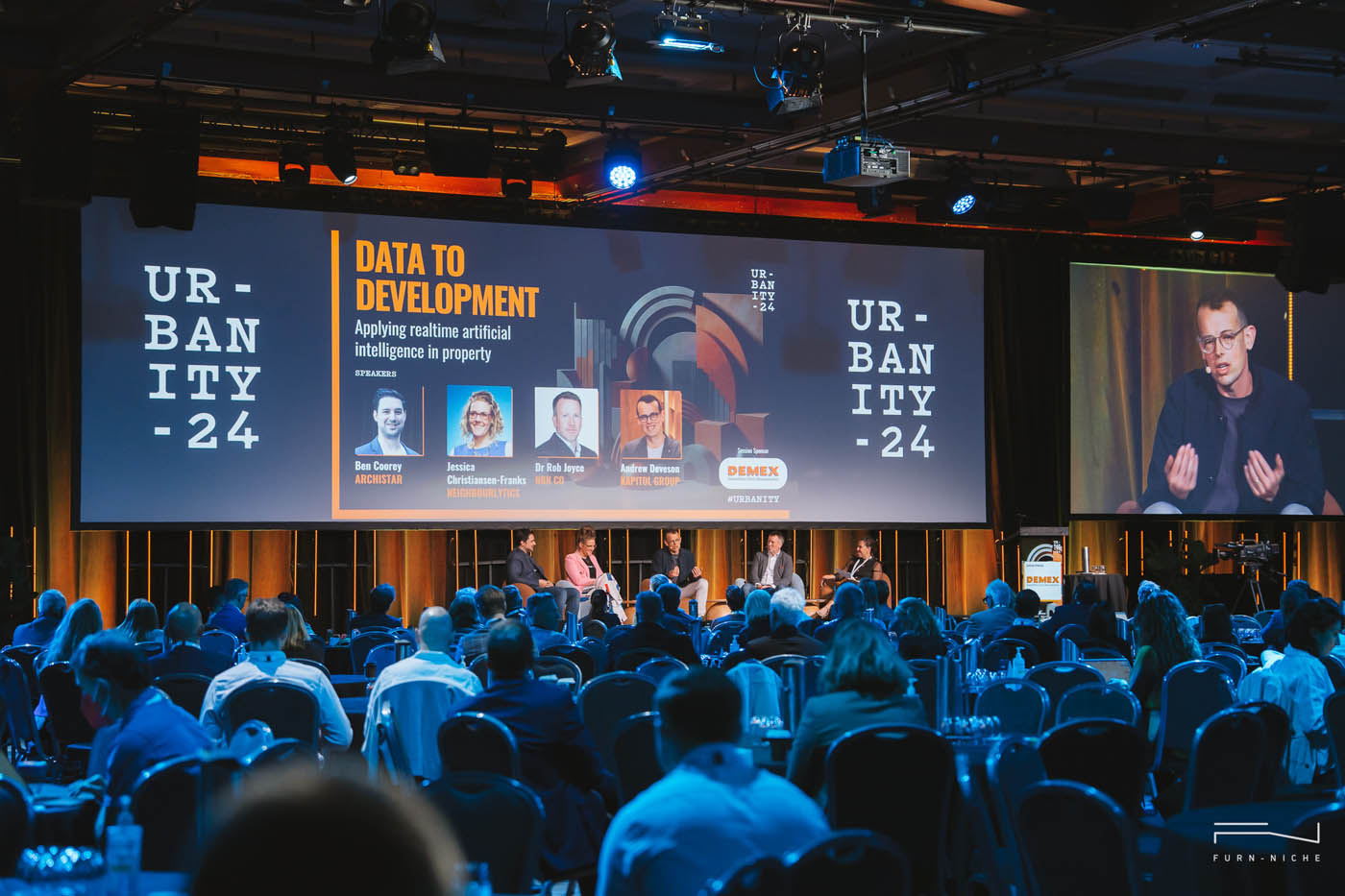
Share this story
Kapitol Group's People & Culture Manager - and newly awarded Australia's HR Manager of the Year - Alice Hanna was recently invited to join Martin Preece on his podcast, The Building Talks. In the episode, Alice discussed her career journey, the issues facing the construction industry and what she believes are the steps to implementing a healthy culture in a construction business. Here are some of the points that resonated most strongly about how to improve workplace culture in the construction industry.
The Journey to HR Manager of the Year
Alice fell into people and culture by accident. Upon completing a Bachelor of Psychology, Alice began her career working in administration for an airline. It was there she was encouraged to apply for a role in the HR department.
She quickly discovered that what she had learned in her psychology degree, and everything she loved about the human mind, could be applied within the workplace.
Alice has extensive experience working in Federal Government, along with the transportation, mining, engineering, and IT industries. After working in IT for over a decade, Alice decided to seek a new challenge in an unfamiliar field, with construction at the top of the list.
Alice is passionate about improving the safety of workplaces, removing traditional obstacles that applicants face in construction, and enhancing the quality of living for staff. She also has a voracious appetite for feedback, making sure every employee's voice is heard, which in turn keeps Kapitol accountable for maintaining an excellent workplace culture.
The importance of culture in the construction industry
While she is quick to speak highly of the industry, Alice says that when compared to all the industries she has worked in, construction is the most behind when it comes to embracing change, gender equality and culture.
"It is harder in this industry for companies to see that the more you focus on people, the more profitable you can be. People are your greatest asset," explains Alice.
One of the main reasons the industry is lagging is due to its approach to innovation.
"Innovation comes from a diversity of thought; diversity of thought comes from a diversity of people. And construction does not have a very diverse industry."
"This is why we have become a shining example of modernisation. When you have employees from different walks of life, you then gain insight into different points of view."
"With this, issues or dilemmas can then be quickly resolved thanks to varied perspectives. All of which leads to efficiency in project delivery and healthy culture within the business," said Alice.
Steps needed to create a strong culture
According to Alice, to overcome existing barriers within construction – such as gender disparity – the barriers need to be analysed and broken down. One way Kapitol facilitates this is by providing a safe and welcoming work environment, with support from senior staff to explore these issues.
Additionally, it is paramount to encourage the constant training and development of staff members regulated by an active pursuit of employee feedback and a commitment from management.
"Flexibility is another important factor as well. Making this work within the constraints of construction is where the challenge presents itself," said Alice.
"The events of the last few years have resulted in a turning point in our industry. It opened people's eyes to the fact that efficiency doesn't lag when working in non-traditional circumstances, such as working from home and staggered start times."
Everybody makes a difference
Every single team member contributes to creating a culture within a business, for better or worse. A vision of inclusion and collaboration that helps articulate what exactly you'd like to strive towards is central to fostering a positive workplace culture.
"Every person in the business has a responsibility to abide by a company's values as well. We role-model the positive behaviours and call out the negative behaviours," said Alice.
For culture to truly succeed, there also needs to be an element of trust from management when it comes to people and culture. As HR is not a physical, tangible thing, it can be challenging to see the value of an embracing workplace.
However, when people feel safe, healthy, and satisfied with their work, they will remain loyal. This much is certain, and soon the positive outcomes will be recognisable on a day-to-day basis.
Consistent feedback and dialogue
Feedback should be sought and provided regularly, not just annually or quarterly. The most successful ways that we have gained feedback are through regular catchups, monthly surveys on work-life balance, and process and efficiency sessions. The goal is to ensure that all the needs of employees from a professional perspective are being met and achieved.
"We then take all of that information and present it to every level of the leadership team and detail what it is people are saying about the organisation, and what needs to change. We then discuss with the leaders about what they need to do and how they need to change," explains Alice.
We ask for feedback on all the areas of workplace culture ranging from work-life balance to how our female workforce is finding the industry. Once the feedback is received, we make every reasonable effort to action it.
The simple fact is that our leadership team doesn't know everything, and we want to encourage the open exchange of thoughts from everybody to continuously get the best possible results.
Positive outcomes
Alice believes that when you have happier people working for you, you have better, safer, and superior results within the business. This then translates into a higher quality of construction for our clients and the projects we deliver.
"We know how much we still have to do. We're not perfect by any means, but we are actively trying to improve around processes, efficiencies, gender, culture, you name it," said Alice.
"As long as we keep getting the feedback, acting on the feedback, then we will keep improving. We need to improve flexibility within our industry and have a united front and contribute to improving the entire industry."
Listen to the full podcast episode here.
The Journey to HR Manager of the Year
Alice fell into people and culture by accident. Upon completing a Bachelor of Psychology, Alice began her career working in administration for an airline. It was there she was encouraged to apply for a role in the HR department.
She quickly discovered that what she had learned in her psychology degree, and everything she loved about the human mind, could be applied within the workplace.
Alice has extensive experience working in Federal Government, along with the transportation, mining, engineering, and IT industries. After working in IT for over a decade, Alice decided to seek a new challenge in an unfamiliar field, with construction at the top of the list.
Alice is passionate about improving the safety of workplaces, removing traditional obstacles that applicants face in construction, and enhancing the quality of living for staff. She also has a voracious appetite for feedback, making sure every employee's voice is heard, which in turn keeps Kapitol accountable for maintaining an excellent workplace culture.
The importance of culture in the construction industry
While she is quick to speak highly of the industry, Alice says that when compared to all the industries she has worked in, construction is the most behind when it comes to embracing change, gender equality and culture.
"It is harder in this industry for companies to see that the more you focus on people, the more profitable you can be. People are your greatest asset," explains Alice.
One of the main reasons the industry is lagging is due to its approach to innovation.
"Innovation comes from a diversity of thought; diversity of thought comes from a diversity of people. And construction does not have a very diverse industry."
"This is why we have become a shining example of modernisation. When you have employees from different walks of life, you then gain insight into different points of view."
"With this, issues or dilemmas can then be quickly resolved thanks to varied perspectives. All of which leads to efficiency in project delivery and healthy culture within the business," said Alice.
Steps needed to create a strong culture
According to Alice, to overcome existing barriers within construction – such as gender disparity – the barriers need to be analysed and broken down. One way Kapitol facilitates this is by providing a safe and welcoming work environment, with support from senior staff to explore these issues.
Additionally, it is paramount to encourage the constant training and development of staff members regulated by an active pursuit of employee feedback and a commitment from management.
"Flexibility is another important factor as well. Making this work within the constraints of construction is where the challenge presents itself," said Alice.
"The events of the last few years have resulted in a turning point in our industry. It opened people's eyes to the fact that efficiency doesn't lag when working in non-traditional circumstances, such as working from home and staggered start times."
Everybody makes a difference
Every single team member contributes to creating a culture within a business, for better or worse. A vision of inclusion and collaboration that helps articulate what exactly you'd like to strive towards is central to fostering a positive workplace culture.
"Every person in the business has a responsibility to abide by a company's values as well. We role-model the positive behaviours and call out the negative behaviours," said Alice.
For culture to truly succeed, there also needs to be an element of trust from management when it comes to people and culture. As HR is not a physical, tangible thing, it can be challenging to see the value of an embracing workplace.
However, when people feel safe, healthy, and satisfied with their work, they will remain loyal. This much is certain, and soon the positive outcomes will be recognisable on a day-to-day basis.
Consistent feedback and dialogue
Feedback should be sought and provided regularly, not just annually or quarterly. The most successful ways that we have gained feedback are through regular catchups, monthly surveys on work-life balance, and process and efficiency sessions. The goal is to ensure that all the needs of employees from a professional perspective are being met and achieved.
"We then take all of that information and present it to every level of the leadership team and detail what it is people are saying about the organisation, and what needs to change. We then discuss with the leaders about what they need to do and how they need to change," explains Alice.
We ask for feedback on all the areas of workplace culture ranging from work-life balance to how our female workforce is finding the industry. Once the feedback is received, we make every reasonable effort to action it.
The simple fact is that our leadership team doesn't know everything, and we want to encourage the open exchange of thoughts from everybody to continuously get the best possible results.
Positive outcomes
Alice believes that when you have happier people working for you, you have better, safer, and superior results within the business. This then translates into a higher quality of construction for our clients and the projects we deliver.
"We know how much we still have to do. We're not perfect by any means, but we are actively trying to improve around processes, efficiencies, gender, culture, you name it," said Alice.
"As long as we keep getting the feedback, acting on the feedback, then we will keep improving. We need to improve flexibility within our industry and have a united front and contribute to improving the entire industry."
Listen to the full podcast episode here.
Latest News

The Urban Developer Article | Melbourne’s $1bn ‘Solar Highrise’ Leads Way to Office Future
Andrew Deveson, recently spoke with The Urban Developer about our role in redefining Melbourne’s CBD.

Green Review Feature | Ushering Sustainable Progress in Construction
Our ESG team were interviewed by Green Review to discuss how we're reducing our environmental impact through design and material choices.

The Urban Developer Article | An ‘Over-Confident Intern’ but AI Exceeding Expectations
In an article written in The Urban Developer, Kapitol's Director Andrew Deveson discusses how much the construction industry is ripe for disruption and change from AI and innovation. The discussion was part of a panel discussion at the 2024 Urbanity Summit entitled 'Data to Development -applying real time AI in property.'
